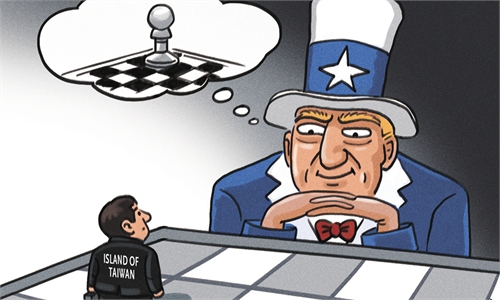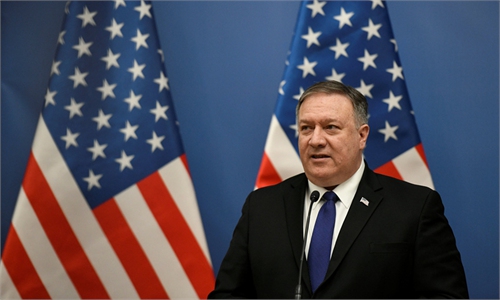
Illustration: Tang Tengfei/GT
The embattled Trump administration said it will hold the US-Taiwan Economic Prosperity Partnership Dialogue with the Taiwan island authorities on Friday. On the US' side, Keith Krach, US State Department's under secretary of state for economic growth, energy, and the environment (who visited Taiwan in August) will lead the talks. On Taiwan's side, Chen Chern-chyi, deputy head in charge of economic affairs on the island, and seven others will attend the dialogue. Meanwhile, Wang Mei-hua, Taiwan's economic affairs head, will hold a virtual conference with Krach in Taipei.Why is this meeting being held? According to information from Taiwan, it is the concrete result of the US-Taiwan economic and commercial dialogues and intensive consultations. At the end of August, David Stilwell, assistant secretary of state for the Bureau of East Asian and Pacific Affairs, announced that the US would launch an annual economic and commercial dialogue with Taiwan. In September, during Krach's visit to Taiwan, it was said that the dialogue mechanism would be initiated. But in the end, it turned into an exchange of views on the relevant details of starting this dialogue.
This is no more than a high-sounding announcement. The actual reason lies with two aspects: First, in this US presidential election, Taiwan was among the very few voices in the world that were optimistic about Trump's win, and have taken concrete actions to support him.
On the very day of the US presidential election, Taiwan was still buying weapons from US arms groups, whom are top Trump supporters. Under such circumstances, Trump needs to take care of the efforts of the Democratic Progressive Party (DPP) authorities and give Taiwan some support on the surface. Moreover, based on the historical experience of the formulation of US-Taiwan Trade and Investment Framework Agreements, this type of dialogue mechanism is often an opportunity for the US to take advantage of Taiwan.
Second, the DPP authorities want to show its friendly relations with the US to the outside world. As far as the DPP authorities are concerned, they need to continue to utilize Trump administration's last 70 days to strive for the biggest promotion of the so-called substantive relationship between the US and the island of Taiwan, so as to cover up the mistake of anticipating Trump's victory they made. At the same time, the DPP hopes to establish a so-called mechanism with Trump to shape and influence Joe Biden's Taiwan policy.
According to Taiwan's media, the US and Taiwan will discuss issues such as global medical security, science and technology, 5G network, supply chain, investment review, infrastructure and energy. This is no doubt just a show of hypocrisy between the DPP authorities and the Trump administration.
From the level of participants and the news released before the dialogue, both parties clearly understand that no achievements can actually be accomplished. Representatives from Taiwan attending the talks in the US are only the deputy heads of the island's economic department. This is far lower than the previous dialogue channels between the US and Taiwan.
On the US side, the one who is responsible for economic negotiations should be the Trade Representative Office, rather than the US State Department. The US appointment of Krach to lead the talks also means that the political nature of this dialogue is far greater than the substantive significance - it will be impossible to reach any concrete results.
In addition, neither the US nor the island of Taiwan is part of the Regional Comprehensive Economic Partnership (RCEP), the largest free trade agreement in the world, signed virtually on Sunday. Their economic dialogue is obviously of no practical significance.
Although the final result of the US presidential election has not yet been concluded, it is widely predicted that Biden will become the next US president. Both Trump and Taiwan leader Tsai Ing-wen are very clear that Trump's policies will not affect Biden.
Therefore, neither party will take this meeting seriously. Tsai cannot make any more mistakes given the fact that she made the wrong bet on the US election. The DPP authorities know that the Trump administration will soon step down. It is therefore very unlikely that the DPP will continue to maintain a long lasting and strong connection with Trump. Recently, the DPP reached out to contact the Biden team, hoping to establish a good relationship with it.
It must also be pointed out that the DPP authorities' attempt to shape the Biden's Taiwan policy is likely to be wishful thinking. Nonetheless, the DPP's continuing role as a saboteur in China-US relations should not be underestimated. There will be ongoing risks from Taiwan to harness the US' pro-Taiwan forces to confront the Chinese mainland. Meanwhile, because a whole-of-government hostile strategy against China was formed in the US, Biden will probably carry on with it. This may enhance so-called US-Taiwan relations and play the risky Taiwan card against the Chinese mainland.
The author is an associate research fellow of the Institute of Taiwan Studies, Chinese Academy of Social Sciences. opinion@globaltimes.com.cn



